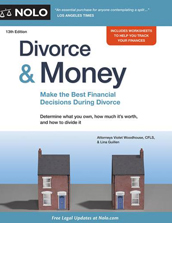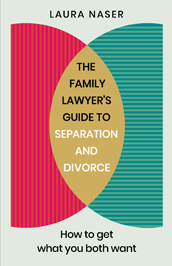Is It Possible To Protect Your Business From Claims By Your Spouse On Divorce?

- This blog contains affiliate links, which we may receive a commission for purchases. The decision is yours, whether or not you decide to buy.
The answer to this question is the lawyer’s favourite answer of “it depends”. A business can come under much scrutiny in a divorce
How much is it worth?
How much income can it produce?
Is there any liquidity in the business so that capital can be extracted from it?
The first thing that a Court will want to establish is the value of the business.
In some cases it is obvious what the business is worth simply by looking at the accounts, but in other cases it will be necessary to have expert evidence to establish the up to date present market value.
These are not valuations carried out by the company’s accountants, but by a joint expert appointed by the Court.
Courts generally accept that valuations of businesses tend to be speculative, and I personally acted for the wife in the successful appeal in the case of P v. P (financial relief:procedure) [2008] EWHC2953, when following the hearing at which the District Judge used a valuation of £730,000 for shares, other shareholders subsequently offered to buy those same shares for £2.4m – £2.8m.
The appeal judge agreed that the original order was no longer fair and should be reviewed. Having established the value of the business, the court then needs to decide how it should be treated in the financial settlement. In the 1990s, the rule was considered to be that if the business was providing an income for the family, it made no sense to sell it.
Justice Coleridge in the decision of N v. N (2001 2FLR 69), made it clear that “those old taboos against selling the goose that lays the golden egg have largely been laid to rest”.
In practice, however, it is still rare for a business to be sold if it is providing an income for the family, and other options are often looked at, such as the party not involved with the business receiving ongoing maintenance or, as happened in P v. P (referred to above), both parties retaining shares in the business.
This latter option is often unattractive for the person who will have day to day involvement in the business, because they feel the other party will unfairly benefit from their efforts post-separation.
There are ways around this, for example in B v. B [2015] EWHC210 (Fam), the value of the shares was apportioned 60% to the husband and 40% to the wife, because the husband’s future endeavours were likely to influence their value.
If one person is going to retain the value of the business in lieu of, for example, equity in the family home, the inherent illiquidity of the business investment can also be reflected in the settlement.
It is also possible if a business has existed prior to the relationship (such as a family business that has been inherited) for part of the value to be treated as non-matrimonial, and not shared in the same way as the other matrimonial assets.
Divorce is not something you will want to contemplate while happily married. However, it is important to consider the implications of any breakdown of that marriage on the business. With the correct planning in place at an early stage, you can take steps to protect your business, such as:
- A prenuptial or postnupital agreement can be helpful when trying to protect your business and limit future claims against it.
- Make sure your Will mirrors the terms of any prenuptial or postnupital agreement regarding how your shares or any cash value will be distributed.
- As far as possible, keep your business assets separate from your private wealth.
- Ensure any loans made to the company are properly and formally documented.
- It is important to strike a balance between involving your spouse in the business (to make use of tax reliefs, for example) and involving them to the extent that they can be said to have contributed to its success.
- Consider the ownership structure of the business – if it is jointly owned with other shareholders, it may be less likely that the Court will take steps that could negatively impact the other shareholders. Consider also having a Shareholders Agreement in place which could give the other shareholders pre-emptive rights to purchase your shares in the event that you were to have to part with your shares in the business for any reason.
- Think about your business early on, before any difficulties arise in your relationship. Avoid making any changes to the company or transferring assets out of it at the time of separation because this may be seen as an attempt to obstruct financial negotiations which you could be criticised for and which might then be detrimental to your long term position.
For all of the above reasons, it is recommended that when dealing with businesses you take advice early so that you can explore all of the options available to you. You should ensure that in any settlement the potential capital gains tax on a future sale of the business is taken into account.
Written by Kirstie Law Solicitor, Collaborative Lawyer and Mediator at Thomson Snell & Passmore. Visit www.ts-p.co.uk for further information.
You may also like
Books
Buy now from Amazon
- Divorce & Money: Make the Best Financial Decisions During Divorce
- The Family Lawyer’s Guide to Separation and Divorce: How to Get What You Both Want
- Parenting Apart
Podcast
Kate Daly is co-founder of amicable and host of the The Divorce Podcast. Kate created The Divorce Podcast to discuss and demystify divorce, separation and co-parenting in the UK. In each episode, Kate is joined by experts in their field to explore divorce and separation from every angle.
Articles
- Finances On Divorce – What Is A Mesher Order?
- How Are Finances Divided On Divorce?
- 10 Divorce Survival Strategies For Women
Videos
Practical advice and tips from professionals on what to do with issues and challenges around divorce from parenting to finance.
Events
Practical tips & advice designed to help people going through divorce, whether online or in person.
Useful links
Here's a selection of organistaioins from parenting to finance to help you with your divorce.
Legal professionals
Related Posts
-

Most Common Age for Divorce in the UK and the Key Reasons Behind It
-

Reclaiming Joy After Divorce: Small Daily Rituals That Make a Big Difference
-

Navigating Social Media During Separation: Essential Dos and Don’ts in the UK
-

Is Silence Destroying Your Marriage? How Poor Communication Leads to Divorce (And What You Can Do About It)
-

When Is the Best Time to Start Family Mediation in the UK? | Guide for Separating Couples




.jpg)



.jpg)

